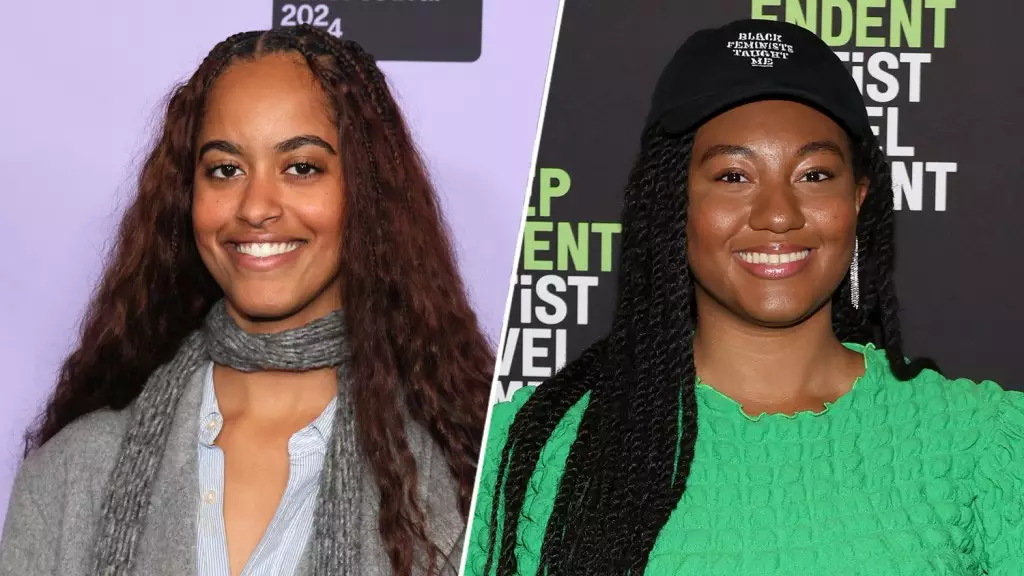In an age where creative expression is often paraded as a hallmark of cultural evolution, the debate surrounding originality in film continues to ignite controversy. The recent debut of Malia Obama’s short film “The Heart” at the 2024 Sundance Film Festival has stirred not just applause but a teeming cauldron of accusations regarding artistic theft. The crux of the matter lies in the claims made by fellow filmmaker Natalie Jasmine Harris, who asserts that President Barack Obama’s daughter drew heavily from her own short film “Grace.” The implications of her words resonate beyond mere accusation; they point to a troubling reality for aspiring artists navigating an industry increasingly dominated by established names.
Harris’s critique transcends the realm of personal grievance. In her detailed essay for Business Insider, she outlines the parallels between her work and Obama’s recent Nike advertisement featuring WNBA star A’ja Wilson. The heart of the issue? A shared motif—a seemingly innocuous game of pat-a-cake—has spiraled into a narrative of disappointment and disillusionment for Harris, who claims specific visual elements including framing and color palettes echo her creative decisions. More than just a battle over artistic credit, this scenario encapsulates the larger struggle for marginalized voices to achieve recognition in a space often overshadowed by the privileged.
The Echoes of Neglect
Harris’s reaction to discovering these similarities is layered with emotion. Upon learning about the commercial, she felt an immediate sense of betrayal—a sentiment that reverberates within the independent filmmaking community. The trauma is not merely personal; it represents a systemic issue that has long haunted creators from underrepresented backgrounds. A crucial aspect of Harris’s argument revolves around the broader implications of such overlaps: if established institutions like Nike turn to high-profile figures for creative input, what hope does that leave for unique, fresh storytelling from emerging talents?
The outcry against her perceived theft speaks to an alarming trend: brands are increasingly sidelining innovative artists in favor of recognizable names, stunting the growth of authentic voices. Harris’s plea for acknowledgment is not just a request for validation; it is a clarion call for a re-evaluation of the pathways that lead to artistic recognition. In a world where Spike Lee and Steven Spielberg once carved out routes for new talents, is the door now closed to anyone lacking a surname that commands respect?
The Unsung Heroes of the Industry
What Harris’s narrative illuminates is more substantial than a singular incident; it opens up a discourse on the plight of independent artists striving for success amidst giants who wield their influence like a sledgehammer. Here we find ourselves grappling with two critical questions: How do we foster creativity if we consistently overlook the innovators in favor of marquee names? And what does it mean for the emerging generation when their art is relegated to the shadows?
For every Malia Obama who steps into the limelight, there are countless creatives like Harris working diligently to bring forth nuanced stories and bold ideas. Their efforts deserve not only respect but elevation. Harris’s assertion that artists in her position may often go unheard resonates deeply, emphasizing the importance of solidarity in an industry rife with power disparities. The angst surrounding her situation underscores a yearning for equity, highlighting the injustices that pervade the creative landscape. There is no merit in talent if the paths are paved for only a select few.
A Call for Collective Responsibility
Fundamentally, the discourse surrounding inspiration and appropriation in artistry must challenge complacency. It begs for a society willing to interrogate the comfort of the familiar and embrace the uncharted territories that emerging artists navigate. Those in positions of power—whether they be part of the elite Hollywood establishment or corporations like Nike—have a collective responsibility to extend their platforms to the multitude of voices yearning for amplification.
As Harris navigates her journey through this turbulent experience, her reflections can inspire a movement for conscientious creation where artistic integrity is honored. Acknowledgment of parallel narratives is essential, but equally vital is the willingness to engage with and elevate the creators whose existence breathes life into the art we hold dear. The true essence of creativity lies not merely in the act of creation but in recognizing and nurturing the collective spirit that binds us all in this intricate tapestry we call cinema.


Leave a Reply